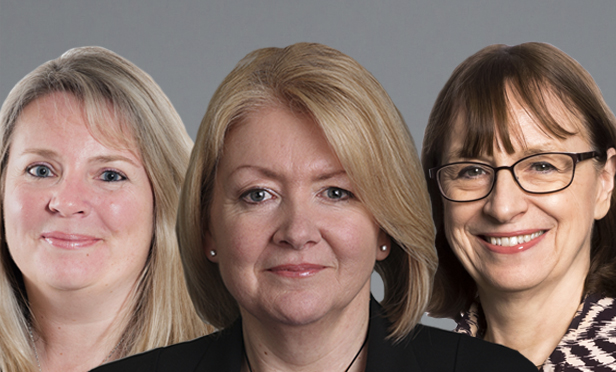Female practice and office heads on the mentors who helped lay the foundations for their career success
Practice and office heads at firms including HSF, Gowling WLG and Eversheds on the push for more women at senior levels of law
March 26, 2018 at 04:42 AM
11 minute read
Despite widespread efforts to boost diversity, there are still relatively few women running global practices at the UK's top law firms. However, the support of mentors – both male and female – is helping some women to push through career barriers and take the leadership roles still predominantly occupied by men.
To coincide with International Women's Day and National Women's History Month in the US, we sought the views of female partners in management positions to find out more about the role that mentors have playing in helped them reach the upper echelons of their firms.
Here, five senior female lawyers – including Eversheds Sutherland's first-ever female UK chair – weigh in on how their mentors have spurred them on.
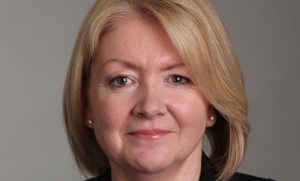 Paula Hodges QC, partner and global head of international arbitration, Herbert Smith Freehills
Paula Hodges QC, partner and global head of international arbitration, Herbert Smith Freehills
Qualified: 1989
Made partner: 1996
Mentor: Charles Plant, former head of litigation at legacy Herbert Smith
What have you learnt from your mentor? Think ahead about your career progression rather than waiting for it to come to you; be open to new opportunities (such as specialising in international arbitration as opposed to doing a mix of litigation and arbitration); make your clients look good; and nurture the star performers in your team.
What are the key challenges to making the relationship work effectively? Respecting each other's viewpoint as the mentee 'grows up' and continuing to seek guidance, however senior you become.
What advice do you have for others considering mentorship? It is a very rewarding and refreshing experience, but requires honest, candid communication both ways.
What has been a career-defining moment for you? When my mentor encouraged me to consider becoming a partner and later to specialise in international arbitration. Also becoming a QC in 2014.
What else would you like to see law firms do to improve gender equality in the workplace? Set targets for female partners and continually assess the progression of female lawyers from the moment they join the firm at every level (for example, relentlessly trying to ensure female candidates are considered for all roles).
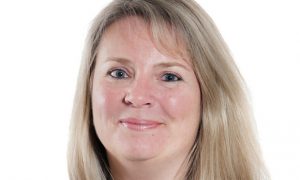 Davinia Gransbury, head of dispute resolution and UK board member, London, Gowling WLG
Davinia Gransbury, head of dispute resolution and UK board member, London, Gowling WLG
Qualified: 1992
Made partner: 1999
Mentor: Quentin Poole, former managing partner and senior partner of Wragge & Co, subsequently Wragge Lawrence Graham & Co
What have you learnt from your mentor? I learnt how to deal with people; how to advise; how to grow the business from my mentor – because he took me along with him every step of the way, involving me in calls and client meetings.
In addition, later on, when I was six years qualified I was then being considered for equity partner. I was progressing through the partnership process when I found out that I was pregnant. I confided in my mentor at the time to explain that I was likely to go away on maternity leave literally as I was going to make partner, if I was successful. But with the absolute support that I received, I left to go on maternity leave as an employee and I returned as partner – and I haven't looked back since.
What are the key challenges to making the relationship work effectively? Transparency, honesty and trust. It's really important to be able to discuss any issues openly and to know that they will be dealt with in confidence but also to understand that there's not necessarily one particular solution to any problem – there could be a number. It's important to retain an open mind, to take advice, and to take it in the context in which it is meant.
What advice do you have for others considering mentorship? Similarly, make sure the relationship works for you so that you feel able to have open conversations. Don't necessarily go with the mentor that's been suggested for you – make sure that it works for you as a relationship; that that person is going to be able to understand the issues you're facing; how to develop your practice and career; and to overcome any particular hurdles you may be facing.
What has been a career-defining moment for you? Apart from the above instance of becoming a partner when I was on my first maternity leave, only a couple of years into partnership, I was asked to consider going for a promotion and becoming involved in management. I felt I was too young, too inexperienced and unequipped for the role – I worried that that promotion was not the right time for me. I still had so much to learn and so many skills to develop – how could I possibly lead and manage people who were more senior than myself?
My initial 'no' was not taken as my last answer! And that was my career-defining moment. I was encouraged to rethink, and to be open-minded about the skills and characteristics and knowledge that I could bring to the role – and so I did embrace it.
What else would you like to see law firms do to improve gender equality in the workplace? A recognition that men and women think differently; we respond to scenarios and circumstances in different ways. We need to heighten self-awareness of how some inbred, innate characteristics can then portray themselves in a working environment – they're not weaknesses, they're just differences.
I have also seen so many people take a pause in their career but then develop it further, having established themselves as a mother and then come back and really pressed on. I'd like to see so much more of that in the future.
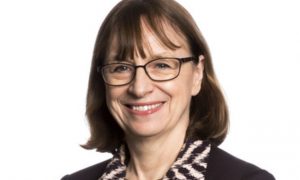 Pamela Thompson, partner and UK financial services head, Eversheds
Pamela Thompson, partner and UK financial services head, Eversheds
Qualified: 1982
Made partner: 1989
Mentor: Richard Millar, former senior partner of Bischoff & Co
What have you learnt from your mentor? Have a passion for your area of law. The open-ended investment company came late to the UK because of our legal system, but my mentor saw the opportunities it would give to the UK asset management industry and led the way in developing it and the legal documents for it. He also taught me to give advice which was relevant and practical to the client and to be prepared to give an opinion, not sit on the fence.
What are the key challenges to making the relationship work effectively? Finding time and encouraging honesty on both sides to ensure the mentor understands the strengths of the mentee to help guide the mentee to make the right choices.
What advice do you have for others considering mentorship? Embrace it; it is probably the most rewarding aspect of your career.
What has been a career-defining moment for you? When two assistants I had mentored made partner at Eversheds Sutherland – Michaela Walker and Julian Brown.
What else would you like to see law firms do to improve gender equality in the workplace? I think it is key not to make it just about women and for women. It must be part of a broader inclusivity programme and must not be just about quotas and policies. It must be led as much by men in the firm as the women to ensure it is embraced by the firm as a whole. Firms should also ensure they ask what people want to see or have in place to help make a change, not just impose their own ideas. Without this, it is difficult to see that significant progress can be made.
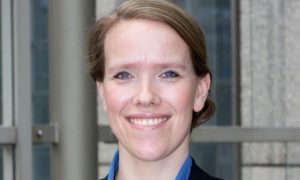 Daphne Broerse, Amsterdam office head, Norton Rose Fulbright
Daphne Broerse, Amsterdam office head, Norton Rose Fulbright
Qualified: 2001
Made partner: 2008
Mentors: EMEA managing partner Martin Scott, banking partner Gijs van Leeuwen, former Norton Rose partner Arent van Wassenaer.
What have you learnt from your mentor? Martin Scott in particular provided leadership encouragement, especially in my transition to office head, and supported me with my aspirations for both the practice and the firm. He approached me to be head of the Amsterdam office while I was off on maternity leave – to be asked to take on the role while everything was changing around me was great motivation.
What are the key challenges to making the relationship work effectively? Young lawyers have to decide on an individual basis what type of mentor is best for their careers. In all instances, young female lawyers should absolutely and unequivocally choose a mentor, and choose many, men included.
What advice do you have for others considering mentorship? The relationship of mentor and mentee can be incredibly enriching and empowering for both parties, opening up fresh perspectives and building a sense of community. Mentors are not only a source of advice and direction but can also be a source of motivation and inspiration during challenging periods.
What has been a career-defining moment for you? As a junior associate, I was the lead of a team advising on a takeover of a district water board. During a difficult negotiation meeting, I was the only lawyer representing my client in negotiations with three very senior partners sitting across the table. Although daunting, I loved the fact that you can earn respect from your client and the counterparty by being your own person and letting your arguments speak for you. Looking back, this experience cemented for me that I wanted to be a lawyer.
What else would you like to see law firms do to improve gender equality in the workplace? Law firms need to be bolder in their steps towards improving gender equality. Slowly but surely, there are more women being represented at management levels – as my own experience of being appointed head of office shows, it is about giving women the opportunity to rise to the challenge.
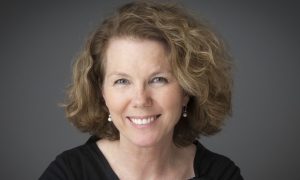 Alison Eddy, London managing partner, Irwin Mitchell
Alison Eddy, London managing partner, Irwin Mitchell
Qualified: 1980
Mentor: Simon Walton was my mentor when I was a young lawyer at Thompsons.
What have you learnt from your mentor? More than anything, Simon made me feel anything was possible and he believed in me. I was at a conference with him in Chicago when he said: "This is all about discrimination and medical law, subjects you care a lot about – get up and address the room." He encouraged me to push myself beyond where I was comfortable and I gained enormous confidence from that.
What are the key challenges to making the relationship work effectively? There has to be a good match, and although both mentor and mentee need to be committed to the relationship, it needs to be driven by the mentee. The relationship is likely to work better if the mentee has chosen the mentor.
What advice do you have for others considering mentorship? Developing others is hugely satisfying and also provides an opportunity to reflect on your own practice. Young mentees can help us understand how the world of work is changing.
What has been a career-defining moment for you? Setting up a London office for Irwin Mitchell in 1995 with two other partners. With five children aged between three and 11, I soon became a dab hand at juggling.
What else would you like to see law firms do to improve gender equality in the workplace? There are now more women than men entering the profession. To ensure women rise through the ranks to the top we need to embed diversity into the firm's culture with male, as well as female champions, sponsoring and mentoring women and role-modelling flexible working.
This content has been archived. It is available through our partners, LexisNexis® and Bloomberg Law.
To view this content, please continue to their sites.
Not a Lexis Subscriber?
Subscribe Now
Not a Bloomberg Law Subscriber?
Subscribe Now
NOT FOR REPRINT
© 2025 ALM Global, LLC, All Rights Reserved. Request academic re-use from www.copyright.com. All other uses, submit a request to [email protected]. For more information visit Asset & Logo Licensing.
You Might Like
View All
“I Bought a £20 Suit From eBay”: How a Social Mobility Scheme Helped Launch a Paul Weiss Associate’s Career
6 minute read
Norton Rose Sues South Africa Government Over 'Unreasonable' Ethnicity Score System
3 minute read
'I Was Getting Straight Nos From Absolutely Everyone': How a Tetraplegic Linklaters Lawyer Defied All Odds
6 minute read
Trending Stories
- 1States Accuse Trump of Thwarting Court's Funding Restoration Order
- 2Microsoft Becomes Latest Tech Company to Face Claims of Stealing Marketing Commissions From Influencers
- 3Coral Gables Attorney Busted for Stalking Lawyer
- 4Trump's DOJ Delays Releasing Jan. 6 FBI Agents List Under Consent Order
- 5Securities Report Says That 2024 Settlements Passed a Total of $5.2B
Who Got The Work
J. Brugh Lower of Gibbons has entered an appearance for industrial equipment supplier Devco Corporation in a pending trademark infringement lawsuit. The suit, accusing the defendant of selling knock-off Graco products, was filed Dec. 18 in New Jersey District Court by Rivkin Radler on behalf of Graco Inc. and Graco Minnesota. The case, assigned to U.S. District Judge Zahid N. Quraishi, is 3:24-cv-11294, Graco Inc. et al v. Devco Corporation.
Who Got The Work
Rebecca Maller-Stein and Kent A. Yalowitz of Arnold & Porter Kaye Scholer have entered their appearances for Hanaco Venture Capital and its executives, Lior Prosor and David Frankel, in a pending securities lawsuit. The action, filed on Dec. 24 in New York Southern District Court by Zell, Aron & Co. on behalf of Goldeneye Advisors, accuses the defendants of negligently and fraudulently managing the plaintiff's $1 million investment. The case, assigned to U.S. District Judge Vernon S. Broderick, is 1:24-cv-09918, Goldeneye Advisors, LLC v. Hanaco Venture Capital, Ltd. et al.
Who Got The Work
Attorneys from A&O Shearman has stepped in as defense counsel for Toronto-Dominion Bank and other defendants in a pending securities class action. The suit, filed Dec. 11 in New York Southern District Court by Bleichmar Fonti & Auld, accuses the defendants of concealing the bank's 'pervasive' deficiencies in regards to its compliance with the Bank Secrecy Act and the quality of its anti-money laundering controls. The case, assigned to U.S. District Judge Arun Subramanian, is 1:24-cv-09445, Gonzalez v. The Toronto-Dominion Bank et al.
Who Got The Work
Crown Castle International, a Pennsylvania company providing shared communications infrastructure, has turned to Luke D. Wolf of Gordon Rees Scully Mansukhani to fend off a pending breach-of-contract lawsuit. The court action, filed Nov. 25 in Michigan Eastern District Court by Hooper Hathaway PC on behalf of The Town Residences LLC, accuses Crown Castle of failing to transfer approximately $30,000 in utility payments from T-Mobile in breach of a roof-top lease and assignment agreement. The case, assigned to U.S. District Judge Susan K. Declercq, is 2:24-cv-13131, The Town Residences LLC v. T-Mobile US, Inc. et al.
Who Got The Work
Wilfred P. Coronato and Daniel M. Schwartz of McCarter & English have stepped in as defense counsel to Electrolux Home Products Inc. in a pending product liability lawsuit. The court action, filed Nov. 26 in New York Eastern District Court by Poulos Lopiccolo PC and Nagel Rice LLP on behalf of David Stern, alleges that the defendant's refrigerators’ drawers and shelving repeatedly break and fall apart within months after purchase. The case, assigned to U.S. District Judge Joan M. Azrack, is 2:24-cv-08204, Stern v. Electrolux Home Products, Inc.
Featured Firms
Law Offices of Gary Martin Hays & Associates, P.C.
(470) 294-1674
Law Offices of Mark E. Salomone
(857) 444-6468
Smith & Hassler
(713) 739-1250





